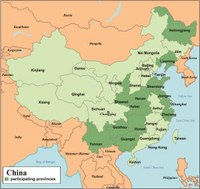China Health and Nutrition Survey
WELCOME! We are proud to announce the availability of biomarker data we collected in 2009 and of most of data we collected in 2015. If you want to use and download the data, please click here. If you have questions, please contact our project manager at chns@unc.edu.
The China Health and Nutrition Survey (CHNS), an ongoing open cohort, international collaborative project between the Carolina Population Center at the University of North Carolina at Chapel Hill and the National Institute for Nutrition and Health (NINH, former National Institute of Nutrition and Food Safety) at the Chinese Center for Disease Control and Prevention (CCDC), was designed to examine the effects of the health, nutrition, and family planning policies and programs implemented by national and local governments and to see how the social and economic transformation of Chinese society is affecting the health and nutritional status of its population. The impact on nutrition and health behaviors and outcomes is gauged by changes in community organizations and programs as well as by changes in sets of household and individual economic, demographic, and social factors.
 The survey was conducted by an international team of researchers whose backgrounds include nutrition, public health, economics, sociology, Chinese studies, and demography. The survey took place over a 7-day period using a multistage, random cluster process to draw a sample of about 7,200 households with over 30,000 individuals in 15 provinces and municipal cities that vary substantially in geography, economic development, public resources, and health indicators. In addition, detailed community data were collected in surveys of food markets, health facilities, family planning officials, and other social services and community leaders.
The survey was conducted by an international team of researchers whose backgrounds include nutrition, public health, economics, sociology, Chinese studies, and demography. The survey took place over a 7-day period using a multistage, random cluster process to draw a sample of about 7,200 households with over 30,000 individuals in 15 provinces and municipal cities that vary substantially in geography, economic development, public resources, and health indicators. In addition, detailed community data were collected in surveys of food markets, health facilities, family planning officials, and other social services and community leaders.
We have several exciting new developments. Three mega cities have joined this cohort since 2011 and three more provinces joined since 2015, fully financially supported by our Chinese collaborators (NINH, CCDC). CHNS 2015 files are ready for public use. Most important are new integrated master files that link longitudinally households and individuals to allow much easier longitudinal analysis. We are continuing to expand the master files and hope to have linked and cleaned all data we have collected over time.
Please address your questions, if you have any, to our project manager at chns@unc.edu.
